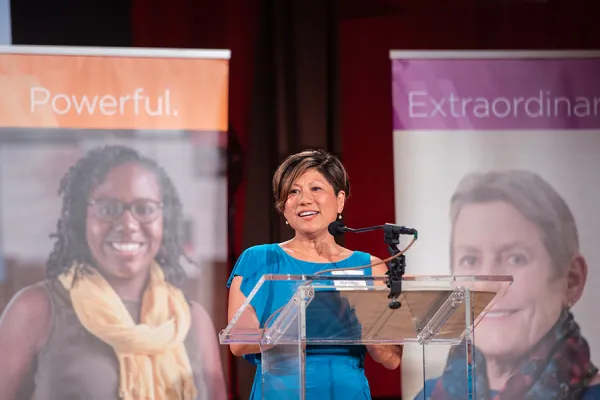Transformative Education: A Conversation with SSW Dean Marianne Yoshioka
Campus Life

Published August 15, 2018
In the 100 years since the Smith College School for Social Work was founded to train women to treat combat veterans of World War I, much has changed about the program.
Yet a guiding principle remains, says Marianne Yoshioka, dean of the school: the “commitment to the depth of education” needed to prepare students as front-line clinical social workers and researchers.
“We’ve built such a strong tradition of teaching clinical practice,” says Yoshioka, who has led the school since 2014. “It’s infused in the entire way our school operates; the methods we teach are the methods we follow.”
At Commencement ceremonies on Friday, Aug. 17, at 4 p.m. in John M. Greene Hall, the School for Social Work will award 132 master’s degrees and six doctoral degrees. Author and activist Sonya Renee Taylor is this year’s Commencement speaker.
Preparing students to help clients address challenges ranging from mental health to addiction remains a focus for SSW faculty and staff, Yoshioka says.
Here’s what else she had to say about the school in its centennial year.
How are you viewing Commencement in this milestone year?
“It’s interesting to think about the similarities—and also the profound differences in our school since that first class graduated in 1918. The reasons people come to study clinical social work are the same: a desire to understand the human condition and to use clinical skills to reduce suffering, improve functioning and develop self-understanding. But our whole attitude within the profession—who is being helped and how—has shifted.”
How has social work changed in the last century?
“Social work is operating on a much more collaborative model, and the issues our students are helping clients cope with during their internships are much more complex and serious.”
How are larger trends in social work affecting the program?
“Insurance rules and strains on agency budgets have reduced the amount of time that many social workers can now spend with a client. That means there is a demand that social workers know how to work with short-term models as well as long-term ones. And there are new, emergent and really serious issues for social work, such as addiction, that have created demand at the intersection of social work and mental health. Aging is probably the largest growth area in our field and will continue to be for some time.
Finally, the use of technology in clinical practice is changing how people do this work. There’s a big push for online therapy, which can impact the development of therapeutic relationships. Our job is to help students be fully prepared for what they will encounter after they graduate and to serve as leaders of clinical practice.”
What new initiatives are underway for the school’s 101st year?
“The aspiration of our program is that our graduates are the leaders in teaching clinical social work as educators, practitioners and researchers. Our school is evolving to amplify the impact of our doctoral program. I’m also very excited that the school is developing a new Office of Professional Education, which will offer continuing education courses around the country and create new opportunities for technical assistance projects.”
What have you learned during this year’s centennial celebration?
“I’ve been touched by how much our alumni really love our school. They are an incredible resource for us in terms of field placements, student support and mentorship. They tell me all the time that something transformative happened to them here.”
Marianne Yoshioka, dean of the Smith College School for Social Work, speaks at a Centennial celebration for the school.